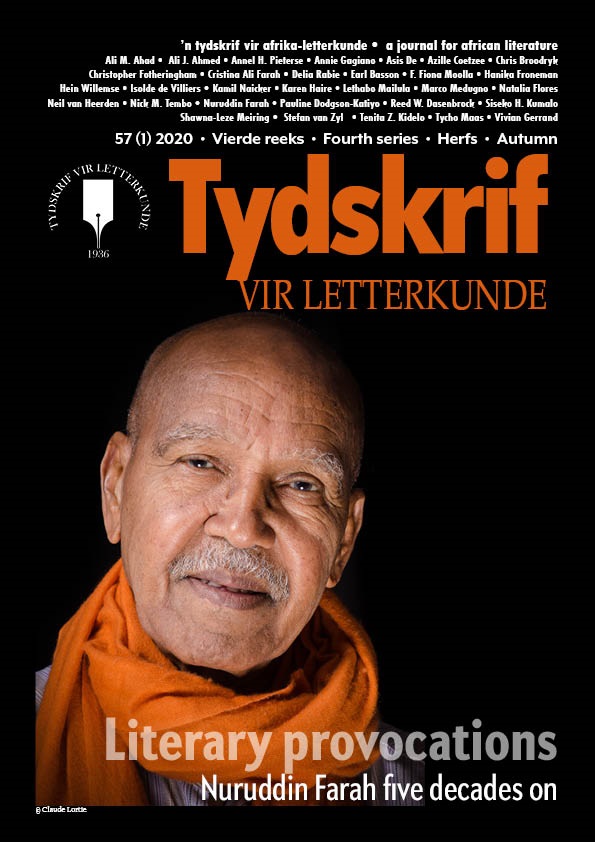Nuruddin Farah and Pascale Casanova: A pas de deux across the world republic of letters
DOI :
https://doi.org/10.17159/2309-9070/tvl.v.57i1.6630Mots-clés :
Nuruddin Farah, Pascale Casanova, world systems literary theory, postcolonial literature, translationRésumé
Nuruddin Farah’s life and work at one and the same time exemplify and highlight contradictions in Pascale Casanova’s The World Republic of Letters, a book that has had major impact in comparative and world literature circuits. As an author who shows in the extreme most of the hallmarks of the dispossessed writer of the periphery, Farah would appear perfectly to illustrate Casanova’s hierarchical, binary, and highly agonistic world literary systems theory, where Euro-America dominates the world, and Paris dominates Euro-America. However, precisely because of his unique position on the literary periphery of the periphery, Farah’s work itself is the practice of Casanova’s theory, carrying within itself the key precepts, especially in its constitutive and conscious transnationalism. In other words, Farah does not derivatively illustrate the theory, but his career and novels preempt through practice the major insights of the theory. But Farah also signposts transformations in Casanova’s world republic of letters in the twenty-first century. Farah’s career, with consecration through prizes and awards increasingly in peripheral countries, suggests a wider polycentrism of influence than allowed in Casanova’s model. The postcolonial aesthetic of teacherliness, furthermore, clearer in the late realism of Farah’s mature work than in that of most other writers, signals a fundamental rewriting rather than renewal of aesthetic modes at Pascale’s literary Greenwich meridian.
Téléchargements
Références
Achebe, Chinua. Things Fall Apart. 1958. Heinemann, 1996.
Agnani, Sunil. “On the Purported Death of Paris.” Postcolonial Studies, vol. 9, no. 3, 2006, pp. 329–335.
Apter, Emily. Against World Literature: On the Politics of Untranslatability. Verso, 2014.
Currey, James. Africa Writes Back: The African Writers Series & the Launch of African Literature. James Currey, 2008.
Ekwensi, Cyprian. People of the City. 1954. Africa World Press, 2004.
Farah, Nuruddin. A Naked Needle. Heinemann, 1976.
Farah, Nuruddin. “Childhood of My Schizophrenia.” Times Literary Supplement, 23–29 November 1990, p. 1264.
Farah, Nuruddin. From a Crooked Rib. Heinemann, 1970.
Farah, Nuruddin. Hiding in Plain Sight. Riverhead-Penguin, 2014.
Farah, Nuruddin. Links. Gerald Duckworth, 2005.
Farah, Nuruddin. North of Dawn. Riverhead Books, 2018.
Farah, Nuruddin. “Why I Write.” Emerging Perspectives on Nuruddin Farah, edited by Derek Wright, Africa World Press, 2002, pp. 1–13.
Fotheringham, Christopher. History’s Flagstones: Nuruddin Farah and Italian Postcolonial Literature. 2015. U of the Witwatersrand, PhD Dissertation.
Jaggi, Maya. “A Combining of Gifts: An Interview.” Third World Quarterly, vol. 11, no. 3, 1989, pp. 171–187.
Moretti, Franco. Graphs, Maps, Trees. Verso, 2005.
Moretti, Franco. Distant Reading. Verso, 2013.
Mulrooney, David. Review of The World Republic of Letters by Pascale Casanova. College and Research Libraries, vol. 66, no. 6, 2005, pp. 552-553.
Prendergast, Christopher, ed. Debating World Literature. Verso, 2004.
Said, Edward. “The Public Role of Writers and Intellectuals.” Nation, Language, and the Ethics of Translation, edited by Sandra Bermann and Michael Wood, Princeton UP, 2005, pp.15–29.
Young, Robert J. C. “World Literature and Language Anxiety.” Approaches to World Literature, edited by Joachim Küpper, Akademie Verlag, 2013, pp. 27–38.
Téléchargements
Publiée
Numéro
Rubrique
Licence
(c) Copyright Tydskrif vir Letterkunde 2020

Ce travail est disponible sous licence Creative Commons Attribution - Partage dans les Mêmes Conditions 4.0 International.


 https://orcid.org/0000-0001-6465-6584
https://orcid.org/0000-0001-6465-6584


.png)